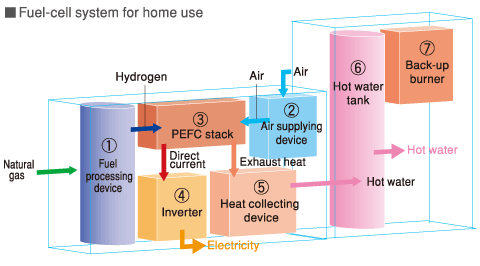A fuel cell is a power generation system from which electricity and heat can be obtained directly by chemical reaction without energy combustion. In addition to the high generation efficiency and the possibility of efficient use of waste heat, it has a variety of advantages, such as low emission of CO2, which causes global warming, and low noise and vibration. It is expected to be an effective tool in solving energy and environmental issues. Hokkaido Gas Co., Ltd. is promoting the development of fuel cells for household use to reduce household energy use and the environmental burden in cold regions.
This type of fuel cell uses a solid polymer electrolyte membrane. It is easy to handle as it operates at low temperatures. Since it is small and lightweight, its development for household, automotive and mobile use is currently being promoted.

This type of fuel cell uses ceramic solid oxide electrolyte. Its operating temperature is 700ºC or higher. It is highly efficient in power generation, and its development is currently under way for use in power plants and industry as well as for household use.
